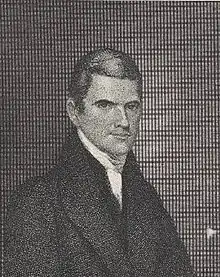John Seys
John Seys (March 30, 1799 – 1872) was an American reverend, missionary, and diplomat.
John Seys | |
|---|---|
 print published in 1835 | |
| United States Ambassador to Liberia | |
| In office January 2, 1867 – June 11, 1870 | |
| President | Andrew Johnson |
| Preceded by | Abraham Hanson |
| Succeeded by | James Milton Turner |
| Personal details | |
| Born | March 30, 1799 St. Croix |
| Died | 1872 (aged 72–73) |
| Children | 12 |
| Occupation | Reverend |
Biography
Seys was born in St. Croix, in the West Indies, to a wealthy white family on March 30, 1799.[1][2][3]
Seys chose to work as a Methodist reverend, and his family disinherited him for it. He started his career by working with the Mohawk peoples for several decades but left for work in Africa in the 1830s.[3][4] Following the death of his predecessor, Beveridge Cox, Seys led the Methodist mission in Liberia for ten years until poor health forced him to resign in 1844.[5][6] During his time in leadership he became actively involved in establishing new schools in the country.[7]
Seys served as Minister Resident to Liberia from the United States from January 2, 1867, to June 11, 1870.[1][7][8] In this position, Seys faced many obstacles due to the lack of funds coming from the United States. In a February 11, 1871, report to the U.S. House of Representatives, Representative Thomas Swann from the United States House Committee on Foreign Affairs stated that Seys "charges salary for sixty days, and also for fifty-eight days, transit in returning to his post, and for the services of W.A. Johnson, vice consul general, $166.66 for four months" which the committee recommended he not be paid.[9] Despite this, he actively pushed against what he saw as the evils of slavery. Although he was opposed to the practice of slavery, he would write in defense of Captain Nathaniel Gordon at Gordon's trial for slave trafficking and piracy.[3]
Seys died in 1872 after having fathered 12 children with five different women, however many died before him due to 'African fever.'[1][2][3]
References
- "John Seys (1799–1872)". history.state.gov. Retrieved 2021-07-03.
- Moore, Howard Parker (1918). The Descendants of Ensign John Moor of Canterbury, N. H. Born 1696-died 1786. Tuttle Company. ISBN 978-0-608-31732-8.
- Soodalter, Ron (2010-05-11). Hanging Captain Gordon: The Life and Trial of an American Slave Trader. Simon and Schuster. ISBN 978-1-4165-2292-8.
- "Black Abolitionist Archive | Liberia". libraries.udmercy.edu. University of Detroit Mercy Libraries. December 15, 1838. Retrieved 2021-07-08.
- The African Repository. American Colonization Society. 1842.
- Jacobs, Sylvia M. (1981). "Nineteenth Century Black Methodist Missionary Bishops in Liberia". Negro History Bulletin. 44 (4): 83–93. JSTOR 44176857. ProQuest 1296737248.
- Interior, United States Department of the (1907). Annual Reports of the Department of the Interior ... U.S. Government Printing Office.
- Blume, Kenneth J. (2010-02-12). The A to Z of U.S. Diplomacy from the Civil War to World War I. Scarecrow Press. ISBN 978-1-4617-1902-1.
- Swann, Thomas. "H. Rept. 41-32 - John Seys, Consul General to Liberia. February 11, 1871. -- Ordered to be printed". GovInfo.gov. U.S. Government Printing Office. Retrieved 15 June 2023.